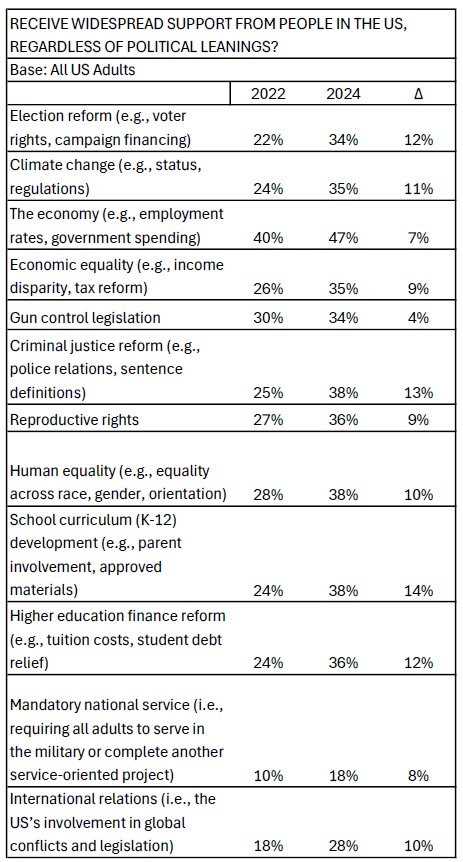The assertion that Americans are irreparably divided has been so frequently bandied about that it has become a widely accepted fact. But is it true? Earlier this summer, The Harris Poll sought out to answer that question by surveying Americans on issues that could receive widespread support, trended against the same 2022 survey for comparison’s sake. While the country is in the midst of a hotly contested presidential election cycle, digging beneath the surface reveals more than just glimmers of hope for American unity.
Interestingly, the shares of people recognizing potential for alignment has increased by double digits on a number of issues in the two years since the last survey. This positive growth holds across party affiliation and ideological leanings—on every single issue across nearly every sub-segment.
The most frequently cited issues U.S. adults think could garner widespread support center around reforming American institutions and policies. Just under half (47%) of U.S. adults think issues related to the economy (e.g., employment rates, government spending) could receive widespread support from people across the United States, regardless of political leanings. This is an increase of 7 percent points from 2022. Issues with the largest growth in the perceived potential for alignment are: school curriculum (+14 percent points from 2022); criminal justice reform (+13 percent points); election reform (+12 percent points); higher education finance reform (+12 percent points); climate change (+11 percent points); international relations (+10 percent points); and human equality (+10 percent points).
Three new issues included in our 2024 poll but not 2022 poll also perform highly: two in five (42%) Americans think issues related to healthcare reform, regulation of prescription medication, and immigration reform could receive widespread support from people across the United States, regardless of political leanings.

Positive growth in the perceived potential for alignment maintained across partisan affiliation.
Beyond specific issues, we also asked Americans about their outlook on their lives and the state of affairs generally.
Very few U.S. adults identify as pessimists. About half (48%) of the country think that they are realists, tending to or trying to have a neutral or objective outlook. Slightly fewer (46%) think that they are optimists, tending to or trying to have a positive or hopeful outlook. Only 5% of Americans think of themselves as pessimists, tending to or trying to have a negative or skeptical outlook.
Most Americans feel good about the current state of their lives and relationships. Two-thirds (68%) of U.S. adults feel positively about the current state of their personal relationships, compared to only 6% who feel negatively and 26% feeling neutral. A similar number feel the same about the current state of their life overall: 66% feel positively, 6% feel negatively, and 27% feel neutral. The positive-negative split extends to education and employment as well: two-thirds (64%) of U.S. adults feel positively about their level of education (5% feel negatively, 32% are neutral); and about half (51%) of U.S. adults feel positively about their employment situation (e.g., employment status, career trajectory), compared to 5% feeling negatively and 32% being neutral.
A majority of Americans are proud of themselves (70%) and of their affiliation with the United States (53%). While over half (52%) think today’s young people are worse off compared how their generation fared when they were their age, two in five (41%) think that their generation is better off compared to the preceding generation.
We also examined civil dialogue and disagreement.
While most Americans (particularly older adults) feel confident in their moral compass, fewer feel confident in expressing opinions with those they disagree with. Four in five (79%) trust themselves to do the right thing, and this increases to 89% among those aged 55+. Half (50%) of U.S. adults agree most of the people they are close to have personal beliefs similar to them (65% among those aged 55+). Only about half (51%) of the country feels confident respectfully expressing their beliefs with someone whom they disagree. A similar number (49%) feel comfortable sharing their personal beliefs with others. Just under half (47%) say they enjoy hearing others’ personal beliefs.
Older Americans also over-index on identifying with tenets of democracy that relate to respect and openness to new ideas. Three in five (59%) U.S. adults agree they are receptive to new ideas (including 66% of those aged 55+). Three in five (58%) Americans agree democracy is stronger when citizens can have respectful discussions with each other about topics they disagree on (70% for 55+). Half (51%) of U.S. adults agree impartial journalism is an essential part of a healthy democracy (65% for 55+).
While politics drives much of the news, most Americans are not that plugged in. Only one-third (32%) of Americans view their political ideology as an important part of their identity, and half (48%) think most political conflict in the United States is driven by small, vocal groups on either extreme of the political spectrum rather than the more moderate majority.
This survey was conducted online in the United States by The Harris Poll from May 10, 2024 to May 13, 2023 among 1,090 US adults, 18+. Figures have been weighted where necessary to bring them into line with their actual proportions within the US population. Respondents for this survey were selected from a pool of potential respondents who have agreed to participate in The Harris Poll’s online research.
Subscribe for more Insights
Subscribe to our newsletter for the latest trends in business, politics, culture, and more.
Download the Data
View the trended data (party affiliation & political ideology)
DownloadView the issues crosstabs (core demographics)
DownloadView the issues crosstabs (generations)
DownloadView the issues crosstabs (education, employment, household income)
DownloadView the outlook crosstabs (core demographics)
DownloadView the outlook crosstabs (generations)
DownloadView the outlook crosstabs (education, employment, household income)
Download











